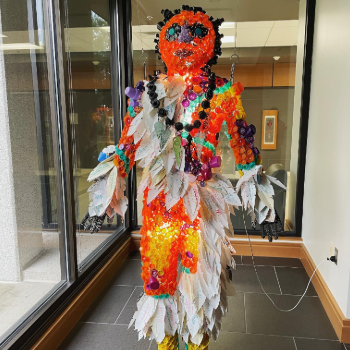We use cookies on this site to enhance your experience.
By selecting “Accept” and continuing to use this website, you consent to the use of cookies.
Search for academic programs, residence, tours and events and more.
Nov. 1, 2024
Print | PDFWhen Dé Bryant received a phone call at 6:30 a.m., her immediate thought was “something bad has happened.” However, her fears were unfounded.
A member of Bryant’s community at Indiana University South Bend was calling to offer congratulations after it was announced on local radio that Bryant had won a significant award for her work as an activist and educator.
“In my sleep-addled brain I said: Thank you very much. I appreciate hearing from you,” recalls Bryant. “Tell me again why I was on the radio?”
Bryant had been named recipient of the 2024 African American Legacy Award from The History Museum in South Bend, Indiana. The museum was established in 1867 with a mission to collect, preserve, interpret, exhibit and teach the heritage of the St. Joseph River Valley region. Since 1991, it has bestowed the African American Legacy Award on individuals who demonstrate leadership in the community and promote African American history and heritage.
Bryant, who earned her master’s degree at Wilfrid Laurier University, was selected for the award based on her significant body of work in social justice and the field of psychology. After earning her Ph.D. from Michigan State University, she began working as a professor at Indiana University South Bend in 1990 and founded the South Bend chapter of Black Lives Matter, as well as what’s known as the Social Action Project.
Bryant’s Social Action Project represents her life’s work as a community psychologist in practice. It uses art in all its forms, from music and poetry to visual arts and even puppetry, to help people manage trauma.
“The objective is to get people thinking about trauma, not as this massive thing that they have to look at, but in its components,” says Bryant.
Bryant works with various groups, including elementary and high school students, adults, and people returning to their communities after incarceration. During community art sessions, each participant distills their story onto a plastic feather that is added to a larger communal art piece called “The Light Bringer.” The Light Bringer is a six-foot-tall, human-like sculpture created entirely out of recycled plastic. By asking participants to add their feather to the Light Bringer’s cloak, it allows them to express something that is difficult to articulate in words.
“The Light Bringer acts as the community's storyteller or shaman, because storytellers and shamans are the people who collect the stories that are part of what people are experiencing,” says Bryant.

By having participants share their stories in this way, Bryant gets a well-rounded understanding of what trauma means to the individual and helps them develop ways to live with their feelings and emotions.
“I’ve always resisted the language that implies it’s going to go away, that we’re going to get over our trauma, because we don’t,” she says.
The seeds of the Social Action Project were planted when Bryant was a master’s student at Laurier in 1985. After completing her undergraduate degree in psychology at the University of Illinois, Bryant was looking to continue her education and was struck by Laurier’s community feel.
“No one told me that there were institutions like Laurier,” she recalls. “I thought all universities had 36,000 students. Laurier gave me a sense of having found a home so I could focus on what I wanted to learn.”
Bryant says she chose Laurier for its innovative master’s in Community Psychology, which places a focus on diversity.
“Not just racial diversity,” says Bryant. “But also, how you look at the definition of mental health and recognize that it can look different depending on what group of people you’re talking with or what historical moment you’re in.”
Laurier’s Community Psychology program takes a value-based, action-oriented and ecological approach – focusing not only on the individual, but also on the social, physical and community environment in which that individual lives.
“It changed my thinking about what questions psychology could be asking and should be asking,” says Bryant. “It gave me the tools to begin to do that, which I did not have from my undergraduate work.”
Manuel Reimer, professor of Community Psychology at Laurier, says the Laurier community is proud to see Bryant receive recognition for her legacy as an agent of social change.
“Dr. Bryant’s leadership for social justice and the wellbeing of equity-deserving groups, alongside her ability to bridge theory, research and action, is exactly what we have been preparing our graduates for since the inception of our Community Psychology graduate program almost 50 years ago.”
Learn more about Bryant’s work with the Social Action Project on Facebook or her website.